When brewing DIY herbal tea, choosing the right filter paper can make a big difference. You'll find options like bleached and unbleached paper filters, biodegradable filters, muslin cloth, and Japanese silk filters. Each type offers unique benefits, from enhancing flavor extraction to simplifying cleanup. Consider factors like filter size, environmental impact, and taste influence when making your choice. Reusable options like cloth tea bags can be eco-friendly and cost-effective for frequent brewers. Whether you prioritize convenience, flavor purity, or sustainability, there's a perfect filter paper for your herbal infusions. Exploring the nuances of each option will help you elevate your tea-making experience.
Types of Tea Filter Papers

When it comes to brewing your own herbal tea, choosing the right filter paper is vital for a clean and flavorful cup. You'll find several types of tea filter papers available, each with its own advantages.
Bleached paper filters are the most common and offer a neutral taste. They're inexpensive and widely available, but some people prefer to avoid the bleaching process.
Unbleached paper filters are a natural alternative, though they may impart a slight paper taste to your tea.
For a more eco-friendly option, consider biodegradable filters made from materials like hemp or corn fiber. These break down easily and don't contribute to environmental waste.
Muslin cloth filters are reusable and allow for a fuller-bodied tea, but require more maintenance.
If you're looking for the purest taste, opt for Japanese silk filters. They're more expensive but provide excellent filtration without affecting the tea's flavor.
For larger batches, consider using disposable filter bags, which offer convenience and easy cleanup.
Remember to match the filter size to your brewing vessel and the amount of herbs you're using to guarantee proper infusion.
Benefits of Using Filter Papers
Using filter papers for your DIY herbal tea offers significant advantages.
You'll experience enhanced flavor extraction as the papers allow water to flow freely through the herbs while trapping particles.
Clean-up becomes a breeze, as you can simply remove and discard the used filter paper with its contents.
Enhanced Flavor Extraction
You'll achieve a more flavorful cup of herbal tea by using filter papers during the brewing process. These papers act as a barrier, allowing water to flow through slowly and extract more of the herbs' essential oils and flavors. This extended contact time between the water and herbs results in a richer, more aromatic infusion.
Filter papers also help distribute the water evenly across the herbs, guaranteeing that all parts of the blend are fully utilized. This uniform extraction prevents any flavor imbalances that might occur when herbs are left to float freely in water. You'll notice a more well-rounded taste profile in your final brew.
Additionally, filter papers can be used to create custom blends. You can mix different herbs and spices within the filter, allowing their flavors to meld together during the steeping process.
This method is particularly useful when combining ingredients with varying steeping times, as the filter keeps everything contained and guarantees an even extraction.
Easy Cleanup Process
Filter papers offer a hassle-free cleanup process that'll save you time and effort. When you're done brewing your herbal tea, simply remove the filter paper containing the used herbs and toss it in the compost or trash. There's no need to strain the tea or deal with loose herbs floating in your cup. This convenience is especially valuable when you're making tea on-the-go or in larger quantities for gatherings.
Using filter papers for your herbal tea infusions provides several benefits:
- Easy disposal of used herbs
- No need for additional straining equipment
- Reduces mess and potential spills
- Simplifies the cleaning of teapots and mugs
You'll find that cleanup becomes a breeze, allowing you to enjoy your tea without worrying about the aftermath. The filter paper acts as a barrier, keeping the herbs contained and preventing them from clogging your sink or leaving residue in your teaware.
This means you can focus on savoring your freshly brewed herbal tea instead of spending time cleaning up. Plus, the quick cleanup process encourages you to experiment with different herb combinations more frequently, enhancing your overall tea-drinking experience.
Choosing the Right Filter Size
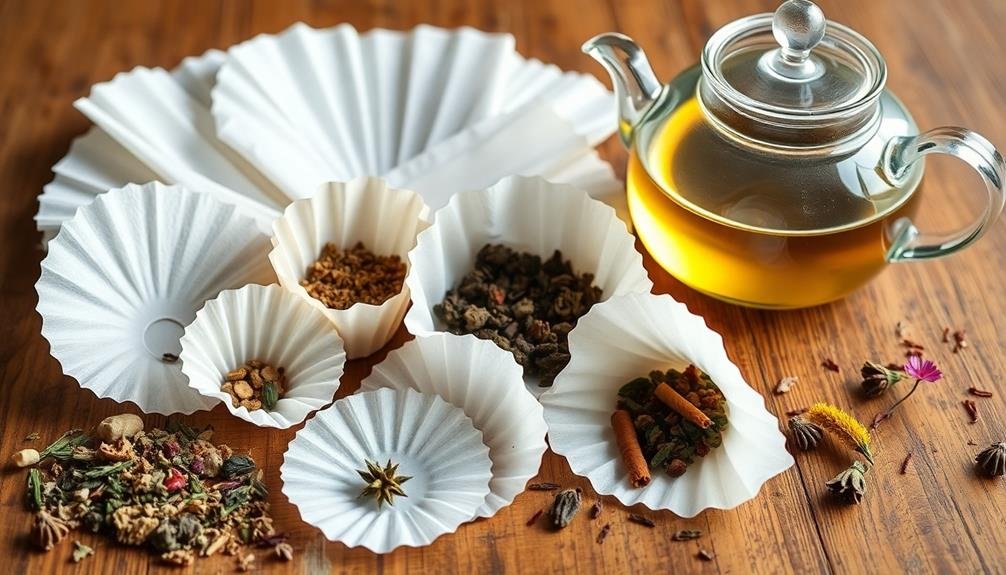
The right filter size is crucial for brewing the perfect cup of herbal tea. When choosing your filter, consider the size of your tea leaves or herbs and the volume of tea you're making. For single-cup brews, small filters around 2-3 inches in diameter work well. If you're making a pot of tea, opt for larger filters measuring 4-6 inches.
Fine mesh filters are ideal for smaller, powdery herbs like chamomile or mint, while larger, looser filters suit whole leaf teas or chunky herb blends. Remember that the filter should allow enough room for the herbs to expand as they steep, so don't overfill it.
If you're using a teapot with a built-in infuser, verify it's large enough to accommodate your chosen herbs without restricting water flow. For those who prefer reusable options, look for stainless steel mesh filters in various sizes to fit different mugs and teapots.
Don't forget to match the filter size to your brewing vessel. A filter that's too large may not fit properly, while one that's too small mightn't hold enough herbs for a flavorful infusion.
Biodegradable vs. Non-Biodegradable Options
When choosing between biodegradable and non-biodegradable tea filters, you'll want to evaluate their environmental impact, durability, and potential influence on taste.
Biodegradable options, like unbleached paper filters, break down easily but may not last as long as reusable metal or cloth alternatives.
Your choice can affect the flavor of your herbal tea, with some materials potentially altering the taste more than others.
Environmental Impact Comparison
Choosing between biodegradable and non-biodegradable options for your DIY herbal tea can considerably impact the environment.
Biodegradable filters, made from materials like unbleached paper or cotton muslin, break down naturally over time, reducing waste in landfills. They're often compostable, contributing to nutrient-rich soil.
Non-biodegradable options, typically made from synthetic materials like nylon or polyester, don't decompose and can persist in the environment for centuries.
When considering environmental impact, remember these key points:
- Biodegradable filters reduce your carbon footprint
- Non-biodegradable options contribute to long-term pollution
- Reusable filters minimize waste but require energy for cleaning
- Single-use biodegradable filters balance convenience and eco-friendliness
You'll want to weigh the production processes of each option too.
Biodegradable filters often require less energy to manufacture, while synthetic materials may involve more resource-intensive processes.
However, if you're using reusable non-biodegradable filters, you'll spread the environmental cost of production over many uses.
Consider your tea-drinking habits and how often you'll use the filters when making your decision.
Longevity and Durability
Frequently overlooked, longevity and durability play essential roles in determining the overall value and environmental impact of your tea-making accessories.
When choosing filter papers for your DIY herbal tea infusions, you'll need to take into account both biodegradable and non-biodegradable options.
Biodegradable filters, often made from materials like unbleached paper or cotton, offer an eco-friendly solution. They'll decompose naturally over time, reducing your environmental footprint. However, they may not withstand multiple uses, requiring more frequent replacement.
Non-biodegradable options, such as nylon or polyester mesh filters, boast superior durability. You can reuse these filters hundreds of times, potentially lasting for years with proper care. This longevity reduces waste and the need for frequent purchases.
However, they don't break down naturally and may contribute to microplastic pollution if not disposed of properly.
To maximize longevity and minimize environmental impact, think about investing in high-quality, reusable non-biodegradable filters. Alternatively, opt for biodegradable filters made from sustainably sourced materials.
Whichever you choose, proper care and cleaning will extend the life of your filters, ensuring you get the most value from your purchase while minimizing waste.
Taste Influence Factors
Beyond durability and environmental impact, the choice between biodegradable and non-biodegradable filters can greatly influence your herbal tea's taste.
Biodegradable filters, often made from natural materials like cotton or bamboo, tend to impart fewer artificial flavors to your brew. They allow for a purer taste experience, letting the true essence of your herbs shine through. On the other hand, non-biodegradable filters, typically made from synthetic materials, may introduce subtle artificial notes to your tea.
When selecting your filter paper, consider these taste-influencing factors:
- Material composition
- Porosity and flow rate
- Chemical treatments
- Thickness and density
The material composition directly affects how much of the herb's oils and flavors are retained or released.
Porosity and flow rate determine the steeping time and extraction efficiency. Some filters undergo chemical treatments that can alter the taste profile of your tea.
Ultimately, the thickness and density of the filter paper impact how much sediment passes through, affecting the tea's body and mouthfeel.
Reusable Cloth Tea Bags
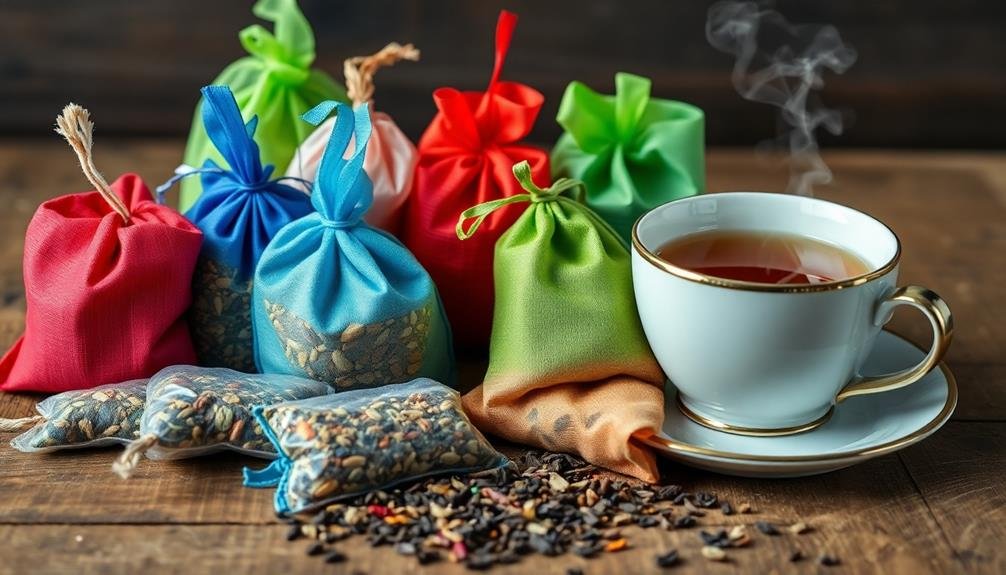
While disposable tea bags are convenient, reusable cloth tea bags offer a more eco-friendly and cost-effective alternative for brewing your DIY herbal teas. These bags are typically made from natural materials like cotton or hemp, which are durable and washable.
You'll find them in various sizes and shapes, allowing you to choose the perfect fit for your teacup or teapot.
To use a reusable cloth tea bag, simply fill it with your chosen loose herbs or tea leaves, tie it securely, and steep as usual. After use, empty the contents and rinse the bag thoroughly. You can wash them by hand or in a washing machine, ensuring they're clean for your next brew.
One advantage of cloth tea bags is their ability to allow better water circulation, resulting in a fuller flavor extraction compared to some disposable options. They're also ideal for larger leaf teas and custom blends that mightn't fit well in pre-made bags.
When selecting cloth tea bags, look for ones with fine weaves to prevent small particles from escaping into your drink. By investing in reusable cloth tea bags, you'll reduce waste and enjoy a more sustainable tea-drinking experience.
Paper vs. Nylon Filters
When choosing between paper and nylon filters for your DIY herbal tea, you'll need to reflect on their distinct material properties and environmental impacts.
Paper filters are biodegradable and compostable, but they may impart a slight papery taste to your brew.
Nylon filters are durable and reusable, potentially reducing waste, but they're made from synthetic materials that don't break down easily in the environment.
Material Properties Comparison
As you explore different methods for brewing your DIY herbal tea, you'll need to contemplate the type of filter you'll use. Paper and nylon filters are two popular options, each with distinct material properties that can affect your brewing experience.
Paper filters are biodegradable and often more affordable. They're excellent at trapping fine particles, resulting in a clearer brew. However, they can absorb some of the tea's essential oils, potentially altering the flavor profile. Paper filters are also single-use, which may not be ideal for environmentally conscious tea enthusiasts.
Nylon filters, on the other hand, are reusable and more durable. They allow more oils and fine particles to pass through, producing a fuller-bodied tea with a richer mouthfeel. While they're easier to clean and maintain, nylon filters may retain flavors from previous brews if not properly cared for.
Consider these key factors when choosing between paper and nylon filters:
- Filtration level: Paper for clarity, nylon for body
- Environmental impact: Nylon is reusable, paper is biodegradable
- Flavor retention: Nylon preserves more oils, paper may absorb some
- Maintenance: Paper is disposable, nylon requires cleaning
Ultimately, your choice depends on your brewing preferences and priorities.
Environmental Impact Analysis
The environmental impact of your filter choice extends beyond the brewing process. When considering paper versus nylon filters, you'll need to weigh several factors.
Paper filters are biodegradable and compostable, breaking down quickly in natural environments. They're often made from renewable resources like bamboo or wood pulp, which can be sustainably harvested.
However, paper filters require more frequent replacement, potentially leading to increased waste and resource consumption over time.
Nylon filters, while not biodegradable, are reusable and have a longer lifespan. This durability reduces the overall waste produced but comes with its own environmental costs. Nylon is a synthetic material derived from petroleum, a non-renewable resource. Its production process is energy-intensive and releases greenhouse gases.
When disposing of nylon filters, they'll likely end up in landfills or contribute to microplastic pollution. You should also consider the energy and water used in cleaning reusable filters.
Ultimately, your choice depends on your priorities. If you're focused on immediate biodegradability, paper filters are preferable. For long-term waste reduction, nylon filters might be the better option, provided you use them for an extended period.
Bleached vs. Unbleached Filters
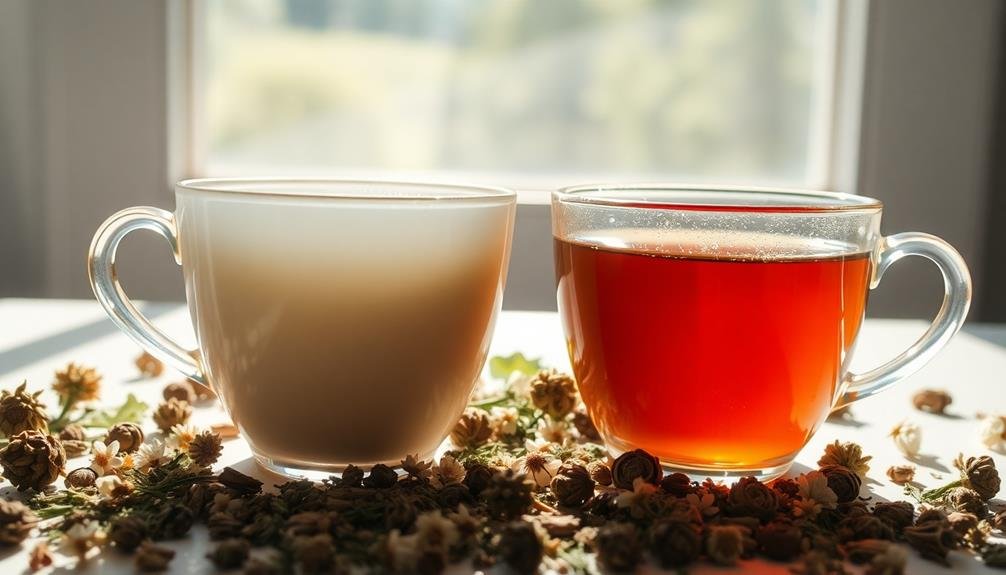
For your DIY herbal tea adventures, choosing the right filter can make a difference in taste and environmental impact. When it comes to filter papers, you'll often encounter two main types: bleached and unbleached. Bleached filters undergo a whitening process, while unbleached filters retain their natural brown color.
Bleached filters are typically chlorine or oxygen-treated, resulting in a crisp, white appearance. They're known for producing a clean, neutral taste and are less likely to impart any paper flavor to your tea.
On the other hand, unbleached filters are minimally processed and considered more eco-friendly. They may add a slight paper taste to your first few brews, but this usually dissipates with use.
Consider these factors when choosing between bleached and unbleached filters:
- Environmental impact: Unbleached filters have a lower carbon footprint
- Taste profile: Bleached filters offer a more neutral flavor
- Aesthetics: Bleached filters provide a cleaner look
- Cost: Unbleached filters are often more affordable
Ultimately, your choice depends on personal preferences, environmental concerns, and the specific herbs you're using for your tea.
Experiment with both types to find the perfect filter for your herbal infusions.
Best Brands for Herbal Infusions
Now that you've chosen the right filter for your DIY herbal tea, let's explore some of the best brands for herbal infusions. These brands offer high-quality, organic herbs that'll elevate your tea-making experience.
When selecting herbs for your infusions, consider factors like flavor profile, health benefits, and sourcing practices. Here's a quick guide to some top brands and their standout offerings:
| Brand | Specialty |
|---|---|
| Mountain Rose Herbs | Organic, sustainably sourced |
| Starwest Botanicals | Wide variety, bulk options |
| Frontier Co-op | Fair trade, non-GMO |
| Buddha Teas | Bleach-free tea bags, unique blends |
Mountain Rose Herbs is known for its commitment to sustainability and organic farming. Starwest Botanicals offers an extensive selection, perfect for experimenting with different blends. Frontier Co-op focuses on fair trade practices and non-GMO products. Buddha Teas provides convenient, pre-packaged options in bleach-free tea bags.
When choosing your herbs, opt for organic whenever possible to avoid pesticides and other harmful chemicals. Look for brands that prioritize freshness and proper storage to guarantee the best flavor and therapeutic properties in your DIY herbal teas.
DIY Filter Paper Alternatives

Eco-conscious tea lovers often seek alternatives to disposable filter papers. If you're looking to reduce waste and explore sustainable options for brewing your herbal infusions, there are several DIY filter paper alternatives you can try.
One popular choice is a reusable cloth tea bag. You can easily make these by sewing small pouches from unbleached cotton or muslin fabric. They're washable and can be used hundreds of times before needing replacement.
Another option is to use a fine-mesh metal tea strainer or infuser ball. These durable tools come in various sizes and shapes to accommodate different amounts of herbs.
For a more natural approach, consider using biodegradable materials like:
- Cheesecloth
- Coffee filters
- Unbleached paper towels
- Large tea leaves (like dried stevia or mint leaves)
If you're feeling adventurous, you can even try the traditional gongfu method of brewing, which involves using a small teapot or gaiwan without any filter. This technique requires some practice but can enhance the flavors of your herbal infusions.
Proper Filter Paper Storage
Proper storage of your filter papers is essential for maintaining their quality and effectiveness. You'll want to keep them in a cool, dry place away from direct sunlight and moisture. A sealed container or resealable plastic bag works well to protect the papers from dust and contaminants.
Store your filter papers flat to prevent creasing or folding, which can affect their performance. If you've purchased a large quantity, consider dividing them into smaller batches for easier access and to minimize exposure to air and humidity.
Keep your filter papers away from strong odors, as they can absorb scents that might affect the taste of your herbal tea. Don't store them near spices, cleaning products, or other aromatic items.
Check your filter papers periodically for signs of discoloration, mold, or unusual smells. If you notice any of these issues, it's best to discard the affected papers to guarantee the quality of your tea.
Enhancing Flavor With Filter Selection
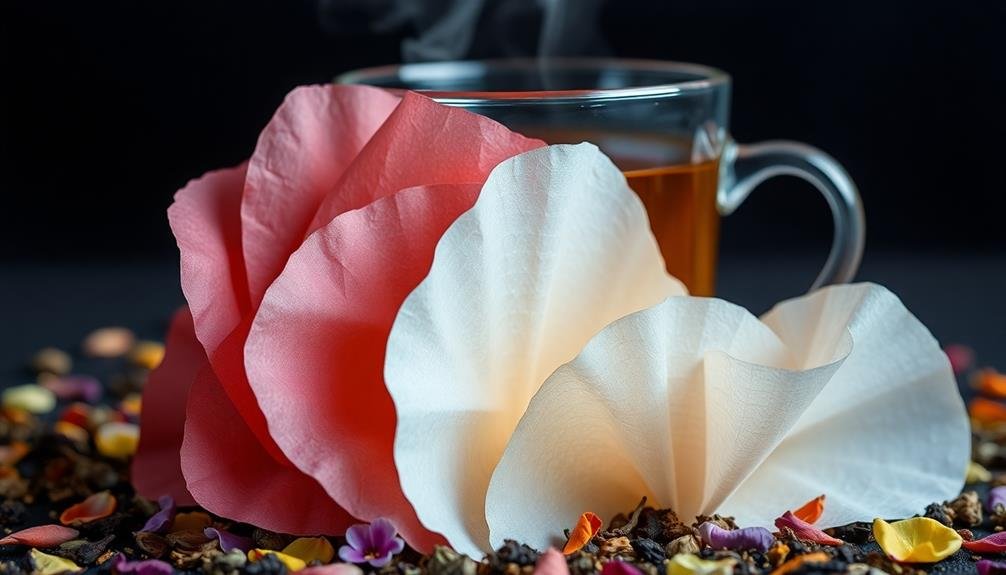
While proper storage guarantees filter quality, the type of filter you choose can considerably impact your herbal tea's flavor. Different materials and thicknesses can affect how the tea's compounds are extracted and filtered. For the best results, consider using unbleached filters, as they don't impart any unwanted flavors to your brew.
If you're after a full-bodied tea, opt for thicker filters that allow for a slower infusion process. These filters retain more of the tea's essential oils, resulting in a richer flavor profile. On the other hand, if you prefer a lighter, more delicate taste, choose thinner filters that allow for quicker brewing.
For those who enjoy experimenting, try using different filter materials to see how they affect your tea's taste:
- Cotton: Produces a clean, pure flavor
- Hemp: Adds a subtle earthy note
- Bamboo: Imparts a light, sweet undertone
- Muslin: Offers a neutral taste and excellent filtration
Environmental Impact of Filter Papers
Tea enthusiasts often overlook the environmental impact of their brewing habits. When selecting filter papers for your DIY herbal tea, take into account their environmental footprint. Disposable paper filters contribute to waste and deforestation, even if they're biodegradable.
However, you can minimize this impact by choosing filters made from sustainable materials. Look for unbleached, chlorine-free filters produced from renewable resources like bamboo or hemp. These options reduce chemical pollution and support eco-friendly farming practices.
Alternatively, opt for reusable filters made from organic cotton or stainless steel. While they require cleaning, they greatly cut down on waste over time.
You'll also want to take into account the packaging of your chosen filters. Select products with minimal or recyclable packaging to further reduce your environmental impact. Some companies even offer compostable packaging options.
Brewing Techniques With Filter Papers
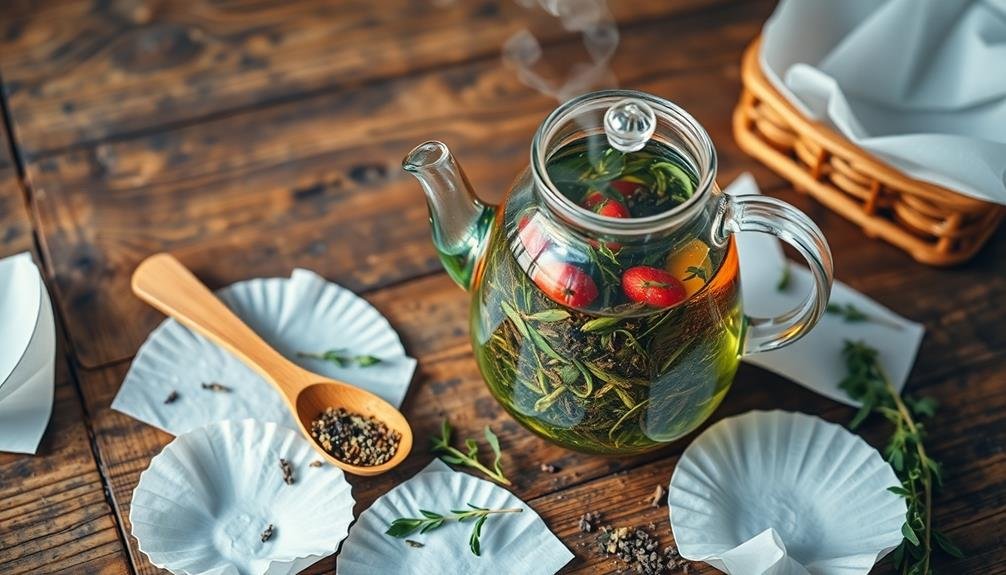
Now that you've chosen an environmentally friendly filter, it's time to master the art of brewing with it. Start by placing your filter in a mug or teapot, ensuring it's securely positioned. Add your chosen herbs to the filter, using about one tablespoon per cup of water. Pour hot water over the herbs, allowing them to steep for the recommended time based on the specific blend.
For ideal flavor extraction, try these techniques:
- Gently press the filter with a spoon to release more essence
- Dunk the filter a few times during steeping to circulate water
- Pre-warm your mug or teapot to maintain temperature
- Use a lid to trap heat and aroma
After steeping, carefully remove the filter and compost the used herbs. If you're using a reusable filter, rinse it thoroughly with hot water and allow it to air dry.
For stronger brews, experiment with longer steeping times or increase the amount of herbs used. Remember, different herbs have varying ideal steep times, so adjust accordingly.
With practice, you'll perfect your brewing technique and create delicious, personalized herbal infusions using your eco-friendly filter papers.
Frequently Asked Questions
Can I Use Coffee Filters for Herbal Tea Infusions?
Yes, you can use coffee filters for herbal tea infusions. They're a convenient option that'll work well for most loose herbs. However, they might affect the tea's flavor slightly and may not be as eco-friendly as reusable alternatives.
How Long Can I Store Unused Tea Filter Papers?
You can store unused tea filter papers for a long time if you keep them dry and clean. They'll typically last indefinitely, but it's best to use them within a year for ideal freshness and performance.
Are There Filter Papers Specifically Designed for Cold Brew Teas?
Yes, you'll find filter papers designed for cold brew teas. They're often larger and more durable to withstand longer steeping times. You can use them for cold infusions, ensuring a smooth, sediment-free brew. They're readily available online and in specialty stores.
Can I Compost Used Tea Filter Papers With the Leaves Inside?
Yes, you can compost used tea filter papers with leaves inside. They're typically biodegradable and will break down quickly. You'll add nutrients to your compost pile, but make certain the papers aren't bleached or contain synthetic materials.
Do Different Filter Materials Affect the Antioxidant Content of Herbal Teas?
Yes, filter materials can affect your herbal tea's antioxidant content. You'll find that unbleached paper filters retain more antioxidants than bleached ones. Cloth and metal filters allow more compounds to pass through, potentially increasing antioxidant levels in your brew.
In Summary
You've now explored the world of tea filter papers for your DIY herbal infusions. Remember, the right filter can enhance flavor and simplify brewing. Choose a size that fits your needs, consider eco-friendly options, and don't forget about reusable cloth bags. Proper storage will keep your filters fresh. With these tips, you'll be well-equipped to create the perfect cup of herbal tea. Enjoy experimenting with different filters and brewing techniques!





Leave a Reply